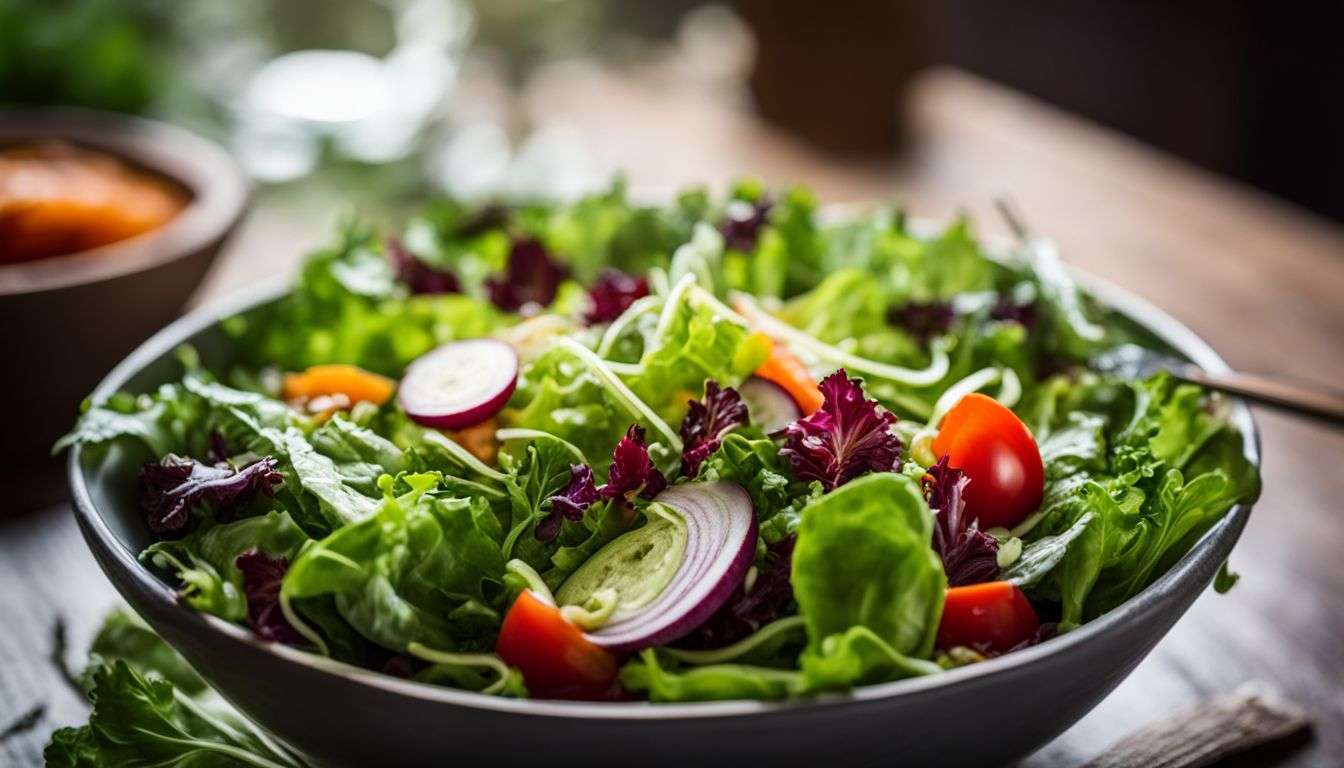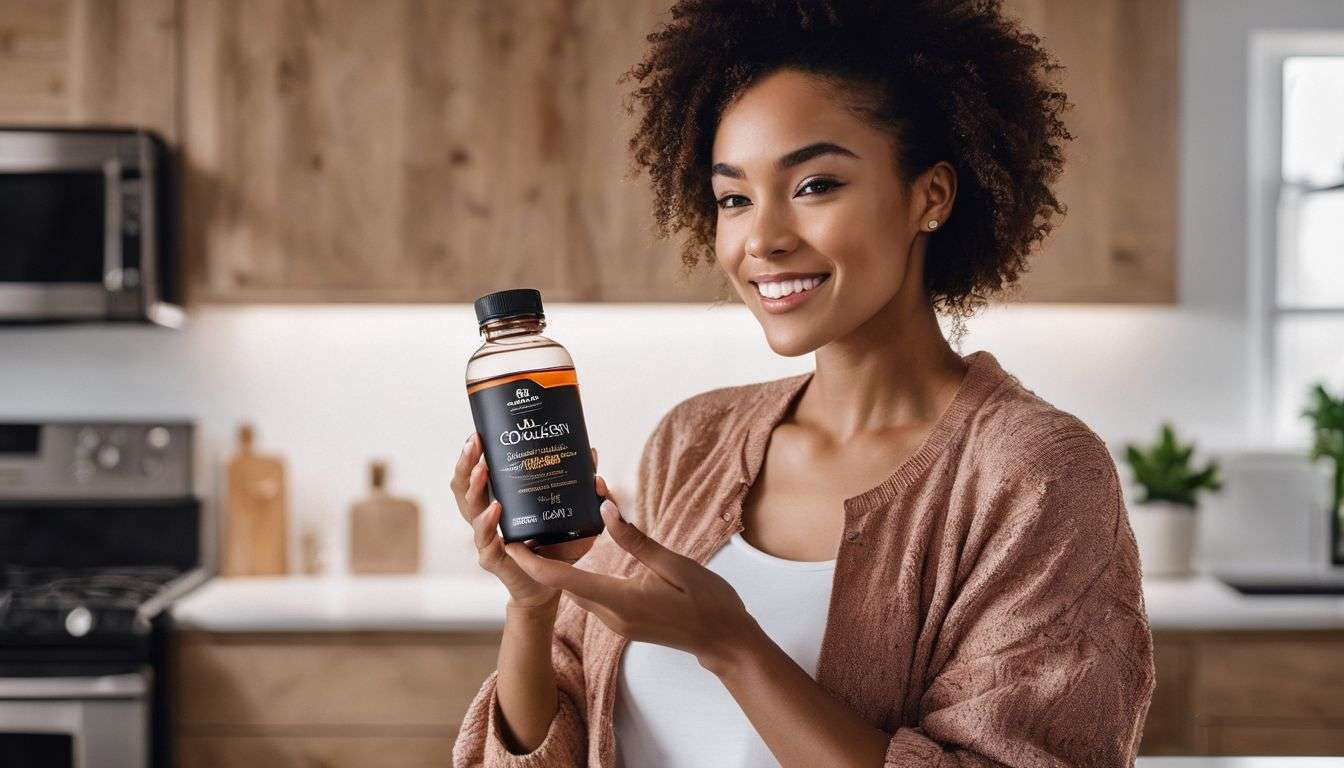Ever noticed how your skin doesn’t bounce back like it used to? Collagen is the superhero that keeps our skin looking youthful, and it makes up a whopping 30% of our body’s protein.
This article is your beacon in the foggy world of collagen supplements, guiding you through what works for those fine lines and achy joints. Keep reading—your journey to understanding collagen starts here!
Key Takeaways
- Collagen is a protein that helps keep skin smooth and joints moving easily, but our bodies make less as we get older.
- Supplements can help by giving us different types of collagen, which support skin health, joint function, and gut wellness.
- Marine, bovine, and hydrolyzed are common sources in supplements; each has unique benefits for the body.
- Pregnant women should talk to their doctors before taking collagen supplements to avoid any potential risks.
- While generally safe, some people may experience side effects like allergic reactions or interactions with other medicines from collagen supplements.
What is Collagen and Its Importance?

Collagen is like the glue that holds your body together. Think of it as strong ropes inside you, keeping your skin smooth and your joints moving easily. It’s a protein—that means it’s made of amino acids, which are like building blocks for different parts of your body, including muscles, bones, skin, and tendons.
As we get older—or if we don’t eat right or get enough sunshine—our bodies make less collagen. This can make our skin wrinkle and our joints ache. That’s why some folks take collagen supplements; they’re trying to give their bodies a bit more of what helps them stay healthy and look good.
Now let’s talk about how collagen works in your body!
Role of Collagen in the Human Body

Collagen acts like glue in our bodies, holding things together. It’s super important for strong bones, stretchy skin, and tough connective tissues. You can find it in your muscles, blood vessels, and even your teeth! Think of it as the body’s support system; without enough collagen, everything would start to get weak or saggy.
Our joints love collagen too because it helps them move smoothly. So when we run or dance, our knees don’t hurt. Also, if you get a cut or scratch, collagen jumps into action to help heal the wound faster.
Next up, let’s talk about what can make our collagen levels go down—things that affect how much we have in our bodies.
Factors Impacting Collagen Levels
4. Factors Impacting Collagen Levels: Ever peek in the mirror and wonder why your skin doesn’t have that bouncy, youthful vibe like it used to? Well, turns out a cocktail of factors—think ticking clocks, sun-soaked days, and even that extra sugar in your latte—can send our body’s collagen production into slow-mo..
But hey, don’t fret; keep reading to uncover how you can give your collagen levels a fighting chance! 🥊🤩.
Aging Process
As we get older, our bodies make less collagen. This can lead to skin that looks old and joints that hurt. Women after menopause and people over 60 often see their collagen quality go down and have lower levels in general.
Skin starts to wrinkle and sag, muscles may get weaker, and tendons and ligaments become stiffer. Even your gut can start to have problems when there isn’t enough good collagen around.
You might notice other signs too like less stretchy skin or a harder time with cuts healing up nice and quick. It’s all part of the aging game – but hey, don’t worry! Good habits like eating right, staying away from cigarettes, getting your exercise on, and using sunscreen can help keep more collagen in check for longer.
Next up: how daily life choices play a big role too!
Lifestyle Habits
Lifestyle habits sure can take a toll on your body’s collagen. Think about the sun—too much UV light from those rays, and bam, it hurts your skin cells. Smoking? That’s just like throwing a wrench in your collagen machine.
And let’s not get started on too much sugar and fast foods—they’re like kryptonite to collagen fibers. To keep that collagen strong, you’ve gotta eat right—lots of fruits, veggies, lean meat, and fish.
Wearing sunscreen is a big win for protecting skin elasticity from those sneaky UV rays. Say “no thanks” to cigarettes if you want to avoid wrinkles showing up before their time. Do some resistance training as well; it gives your muscles—and yes—your collage a good boost! So remember this: what you do every day plays a big part in how well your body makes and keeps collagen.
Diseases
So, while we’re at it, let’s talk about what happens when things go wrong. Diseases can really throw a wrench in how our bodies make collagen. Think of rheumatoid arthritis or lupus; they’re like unwelcome guests that create chaos in the system.
These conditions attack healthy parts of our body, including the joints where collagen is super important.
But wait, there’s more — scleroderma and dermatomyositis don’t play nice either. They mess with our skin and muscles. And if someone has genes making them prone to these troubles? That complicates stuff even more! The body’s normal healing game gets all twisted, leading to weaker support structures inside us.
It’s not just about looking young; we need that collagen intact for staying strong and bendy!
Different Types of Collagen and Their Functions
Alright, let’s dive into the world of collagen—think of it as a protein party where every guest has a unique superpower. From the plumpness of your cheeks to the spring in your step, different types strut their stuff in various parts of your body.
But hey, it’s not just about looking good; each type has a job description that could make even the most accomplished multitasker blush! Stay tuned as we unravel these mighty proteins and their kick-butt roles..
Collagen Type 1
Collagen Type 1 is like the superhero of collagens—it’s super strong and found all over your body. Think of it as the building blocks for your skin, bones, teeth, connective tissues, and tendons.
It’s really important because it helps keep these parts of your body healthy and holding together properly.
As we get older or if we don’t take care of ourselves well enough, our bodies might not make as much collagen type 1 anymore. Especially in women who have gone through menopause and people who are over 60— they often see a drop in production.
What happens then? Well, things aren’t as springy or firm as they used to be—and yeah, that can mean more wrinkles and less sturdy joints. So keeping an eye on this mighty protein is key to feeling good inside out!
Collagen Type 2
Collagen Type 2 is the main player in our cartilage, that squishy stuff that cushions your joints. Think of it as your body’s shock absorber when you jump or run. It helps your knees not to hurt and keeps things smooth between bones.
Sadly, getting older means less of this good stuff around.
Now, don’t get me started on those nasty diseases like rheumatoid arthritis; they’re out there looking to mess with our collagen Type 2. But hey! Taking some chicken collagen might just be the ticket to help keep those joints happy and healthy—talk about a tasty way to stay in tip-top shape!
Collagen Type 3
Type III collagen is like the hidden hero in our bodies, hanging out in muscles, arteries, and organs. It’s super important because it gives these parts of us their shape and keeps them strong.
Think of it as a tough little helper that holds everything together so we can move around and do all our favorite things.
Now, just picture your body as a house – type III collagen would be like the beams inside the walls. They’re not something you see when you walk in, but without them, the house wouldn’t stand up very well! That’s why getting enough type III collagen from food or supplements can really help keep you feeling sturdy and ready for action.
Sources of Collagen in Supplements
Diving into the wide sea of collagen sources, you’re likely to bump into a few favorites that frequent the shelves of your local health store. Think marine life giving up its glow for your skin or cows and chickens playing their part in keeping our joints dance-floor ready—each source has its own backstage pass to our body’s rejuvenation fest!
Marine Collagen
Marine collagen comes from fish and is a hit with folks who care about their skin and joints. It’s like bovine collagen but has smaller peptides, which may be easier for your body to use.
Imagine tiny builders getting into tight spaces to fix things up – that’s what these small peptides do in your body.
People choose marine collagen as it fits into diets that don’t include cow products. Plus, fans of the ocean can smile knowing it often comes from fish parts that might otherwise go unused! After chatting about marine wonders, let’s moo-ve on over to another source: bovine collagen.
Bovine Collagen
Bovine collagen comes from cows, especially their skin, bones, and muscles. It’s packed with types I and III collagen. These are the guys that make your skin firm and your joints happy! Think of it like a boost for what your body already makes.
Lots of people use it to try to stay looking young and keep their bones strong.
Now let’s get this straight—bovine collagen is just one choice in the world of supplements. If you’re into healthy living or want to up your game, bovine might be good for you. It’s like picking a team player that supports all the hard work your body does every day!
Hydrolysed Collagen
Moving on from bovine collagen, let’s talk about hydrolysed collagen. This special kind is broken down into smaller pieces called peptides. Your body can easily use these little guys for building and repairing stuff like skin and bones.
Lots of people take hydrolysed collagen in their shakes or morning coffee to help them look younger and keep their joints happy.
This type of collagen comes from different animals, but the cool part is how it works in your body. When you eat it, it goes right to work helping your skin stay smooth and makes sure your skeletal system stays strong.
Studies even say this stuff could be great for keeping your skin and bones healthy! So if you’re thinking about adding some oomph to your health routine, hydrolysed collagen might just be what you need.
Benefits of Taking Collagen Supplements
Dive into the world of collagen supplements and you might just find that your skin starts to thank you—with a little more bounce, your joints with a wink for that newfound ease, and your gut..
well, let’s just say it could be the beginning of a beautiful friendship. Curious? Keep on reading!
Skin Health
Skin needs collagen to look young and healthy. It’s like a magic glue that sticks cells together, keeps skin smooth, and helps it stretch without breaking. As we get older, our bodies make less collagen.
This can lead to wrinkles and saggy skin. But hey, there’s good news! Taking collagen supplements might help with this.
These supplements come from different places – like cows (bovine), fish (marine), or even special water-treated types (hydrolyzed). They give your body extra building blocks to repair the skin and keep it hydrated.
Imagine giving your skin a drink of water from the inside out—it loves that—a lot! So when you’re thinking about keeping your skin bouncy like a fresh sponge cake, adding some extra collagen to your diet could be just what you need.
Joint Health
Moving from skin, let’s talk about joints. Collagen is like a cushion for them. As you get older, your body makes less collagen, and that can make your joints hurt. Supplements might help with this pain.
Many people take them to try and help their knees and other spots feel better.
Marine collagen is special because it has a lot of type II collagen—the kind your cartilage needs. Some studies say taking marine collagen can make arteries healthier too. This could mean good news for joint health since everything in the body is connected!
Gut Health
Just like your joints get a boost from collagen, your stomach might too. Collagen can play a big part in gut health. It helps form the tissue that lines your stomach and intestines.
This lining is super important for stopping bad stuff from getting into your body through your digestive system.
Collagen isn’t just good for making skin pretty or keeping bones strong. It could also help out with tummy troubles. Some folks think it might heal the gut and make digestion better.
When you’re considering a dietary supplement to help with digestion, collagen could be on that list – but don’t forget about eating well-rounded meals too! Foods rich in vitamins and protein are great for overall health, including keeping that belly happy.
Collagen During Pregnancy: Myths and Facts
Talking about collagen and pregnancy can get a bit tricky. There’s a lot of chatter out there, but let’s clear up what’s real and what’s just a tall tale.
- Many people think pregnant women shouldn’t take collagen supplements. That’s not always true. Doctors say it can be okay, but always ask your doctor first.
- Some folks believe taking collagen when you’re pregnant makes your skin extra stretchy so it won’t get stripy lines. Sadly, no proof says that’s the case. According to a review published in the British Journal of General Practice, the development of stretch marks is more influenced by factors like genetics and the extent of skin stretching during pregnancy rather than specific supplements (“Stretch marks in pregnancy,” BJGP, 2015)
- You might hear that eating more collagen will give your baby strong bones. The truth is, there’s no direct link to show it works that way. According to the journal “Nutrition and Bone Health in Women after the menopause,” Women’s Health Medicine, 2004, fetal bone development is primarily influenced by nutrients like calcium and vitamin D
- A big worry for some is that collagen might harm the baby. No studies have found this happens, but being safe and checking with healthcare experts is best.
- It’s said collagen pills are the same as creams or powders for moms-to-be. Nope, each type has different stuff in it. Pills are not creams or powders. This is according to a study on “Oral Collagen Supplementation: A Systematic Review of Dermatological Applications,” Journal of Drugs in Dermatology, 2019.
- People chat about how collagen helps keep hair thick during pregnancy. This one actually holds up! Collagen may support hair health.
- Another common belief is that all types of collagen are good during pregnancy. In reality, some types may be better than others depending on your needs — like Type I for skin.
- Tons of tales suggest only animal-based collagen is helpful. However, vegetarians can look into alternatives with similar benefits like vitamin C-rich foods and zinc staples such as chickpeas and tofu.
- Expecting mothers often worry about allergies from collagen supplements. It’s smart to check labels closely if you have fish or other food allergies before taking any supplement.
- The idea floats around that once you start taking collagen while pregnant, you can’t stop until after breastfeeding ends. Not so; you decide with your healthcare provider what works best for you.
Potential Side Effects of Collagen Supplements
Not all things work out for everyone, and that’s true for collagen supplements too. Some folks might face troubles, so let’s dive into what those could be.
– High calcium levels: If a supplement has too much of it — boom! You’ve got high calcium problems.
– Allergic reactions – Watch out if you have allergies, especially to fish or eggs, because some products are made from these.
– Bad aftertaste: Ew! No one likes a yucky taste lingering in their mouth. That can happen with these pills and powders.
– Medicine mix-up: Taking other meds? Heads up – your collagen might not get along with them.
– Ask your doc first: Really important to chat with your GP before starting any new pill routine.
– Don’t swap treatment: Keep munching on apples and hitting the gym; supplements aren’t stand-ins for real food or doctor visits!
– Different doses needed: How much you should take can change depending on which type of collagen you’re eyeing.
They say it’s mostly safe but still good to keep an eye out just in case something feels off.
What Are the Different Types of Collagen and Which One is Best for Supplements?
There are different types of collagen, including type I, II, and III, each with its own benefits for skin, joints, and overall health. When it comes to supplements, natural collagen sourced from fish or animals is considered better than synthetic collagen, as it closely resembles the collagen found in the human body.
Conclusion
Alright, let’s wrap this up! You’ve got the scoop on collagen now. From keeping your skin bouncy to helping those achy joints, it’s a superstar protein. Remember, though – not every collagen supplement is the same.
Choose wisely and think about what your own body needs. Here’s to feeling good inside and out! Keep shining, folks!
Discover the truth about collagen supplements during pregnancy and separate myth from fact.
FAQs
1. What’s this buzz about collagen peptides in supplements?
Ah, collagen peptides! They’re like little power-packed protein pieces that we mix into drinks or foods. Our body loves them because they can help our skin look good and might even make our joints feel better.
2. Can taking collagen really help with joint pain or is that just a myth?
Listen up! It’s not just old wives’ tales — studies show that hydrolyzed collagen supplements can actually reduce joint pain after some physical activity. Think of it as oil for your creaky joints!
3. Are there different types of collagen in these supplements?
You betcha! Type I collage is all about skin hydration and wound healing, while type V works its magic deeper in the matrix of tissues… Science-y stuff aside, each type has a unique “superpower.”
4. Why do people say fish collagen is so great?
Oh, fish collagen is pretty neat because it has this cool triple helix thing going on that makes it super easy for your digestive tract to absorb—kinda like when you sip through a straw instead of trying to slurp soup with a fork.
5. Do I have to worry about where my collagen comes from? Organic bone broth sounds fancy…
It sure does sound fancy, but the idea here is that pasture-raised animals or clean sources like organic bone broth might give us cleaner and possibly healthier forms of animal collagens—like eating veggies without any icky pesticides!
6. If I’m getting plenty of sun and eating right, why would I need a supplement with biotin and herbs added to my collagen?
Well, think of it this way: Even if you’re doing everything right (kudos!), adding extras like biotin and herbs could give your body an extra nudge — kinda like having both belt *and* suspenders keeping those pants up just in case one fails… And hey, who doesn’t love an extra bit of support?





